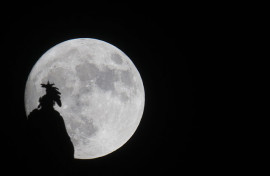1726995491-0/Copy-of-Untitled-(10)1726995491-0.png)
On September 22, day and night will be almost equal in duration across most parts of the world, including Pakistan, as the autumnal equinox or September Equinox takes place.
According to astronomical data, the equinox will occur at 5:43 PM Pakistan time, marking a significant celestial event.
The equinox is an annual event that happens twice a year, in March and September, when the Sun's rays fall directly on the equator.
The equinox occurs when the Sun crosses the celestial equator, moving from the northern to the southern hemisphere. As a result, most parts of the world, including Pakistan, will experience approximately 12 hours of daylight and 12 hours of night.
At the time of the equinox, the Sun rises directly in the east and sets directly in the west, making this an important astronomical phenomenon.
A similar event happens during the spring equinox in March when the Sun moves northwards across the equator.
1726995415-0/Copy-of-Untitled-(9)1726995415-0.png)
The autumnal equinox is a temporary pause before day and night lengths start to shift, depending on the hemisphere.
In the northern hemisphere, it signals the start of autumn, leading to shorter days and longer nights as winter approaches. Conversely, in the southern hemisphere, spring begins with longer days and shorter nights as temperatures gradually rise.
In Pakistan, the autumnal equinox signifies the beginning of autumn.
As the Sun moves southward, the cold months start in the Northern Hemisphere, during which the days become shorter, and the nights grow longer.
The Earth's tilt on its axis and its orbit around the Sun cause these seasonal changes, with the summer and winter solstices marking the longest and shortest days of the year, respectively.
1718122402-0/will-ferrel-(1)1718122402-0-405x300.webp)


1726819153-0/BeFunky-collage-(18)1726819153-0-165x106.webp)


1697447887-0/download-(1)1697447887-0-270x192.webp)














COMMENTS
Comments are moderated and generally will be posted if they are on-topic and not abusive.
For more information, please see our Comments FAQ